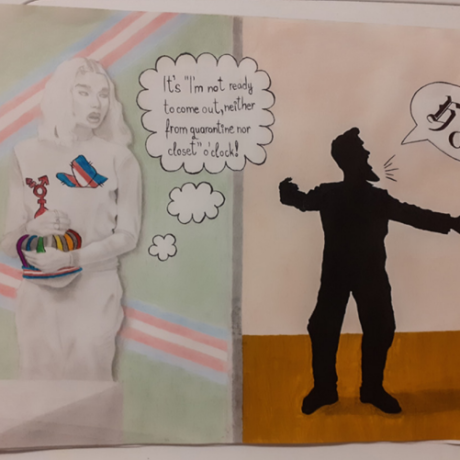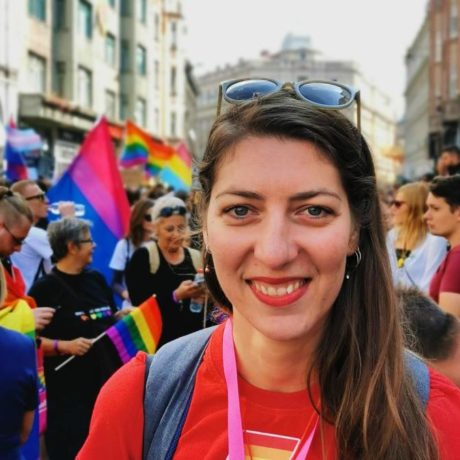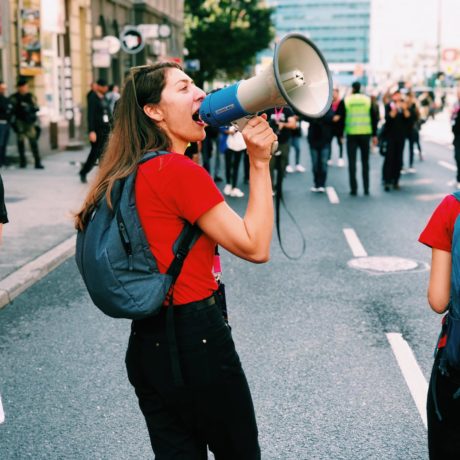
Over the Rainbow
- From March until June 2021, connected to important Human Rights Days, The Norwegian Helsinki Committee will be sharing stories from some of Europe’s brave and energetic human rights defenders.
- Our aim is that young people in Norway will learn more about and get engaged in the situation for LGBTI persons in Europe.
- The initiative, “Over the Rainbow”, is carried out in collaboration with the online news portal Framtida.
- Stay tuned for interesting stories, events and even a competition or two!
– Pride month is important to make LGBTI history, struggle and solidarity visible and relevant to both policy makers and population, says Mina Skouen, who is responsible for Equal Rights in the Norwegian Helsinki Committee.
– Our parades are manifestations of our existence, that we are not hiding, and that we are claiming our fundamental human rights. The colorful character of the prides has a proud symbolic value, from the Stonewall Riots in New York in 1969, and the political civil rights movement led by Harvey Milk in San Francisco a decade later.
To mark the beginning of this important month, we have talked to Dajana Bakić, Head of Tuzla Open Center in Bosnia Herzegovina, and one of the organizers of the first Pride march in her country. She is also active politically in the Social Democratic Party of Bosnia Herzegovina, and with the European network Rainbow Rose.
We are happy that she wanted to share her thoughts on her work for LGBTI equal rights, and the importance of political representation.

Every action is political
Dajana Bakić, is 34 years old, and an activist born and raised in Tuzla, Bosnia Herzegovina.
– I am a girl from the neighbourhood, raised in working class family on socialist values on which I’m trying to live by this day. I love my family, friendships, and being part of a community. And I love politics and working for the community.
And as a neighbourhood girl, she has left her mark on building a safer neighbourhood. Tuzla Open Center is a safe venue for queer people in the city, and their offices are frequently used by the community. During the most isolated months of the Covid 19 pandemic, they also provided an online space where people could come together from their home quarantine.
TOC’ program and vision is not dedicated to LGBTI rights alone, but to a society where all are equal before the law, including because of racial and national identity, or social and economic class. In a post-war society, and a country where ethnic belonging is deeply rooted into the political and administrative system – and even the constitution – this is not a given.
– I’m mostly proud that I stayed true to myself and my values. Those are the basis for my motivation to work – to make change happen. Such as my political career and me being elected as young Councillor in Tuzla, activism for justice for students, women, LGBTI people. I believe that I’m on the right side of history!
There is no rain on my parade!
And an important part of the history that Dajana has been part of developing, is the first ever Bosnia Herzegovina Pride March, in September 2019. After year’s of planning; parade participants could finally gather in Sarajevo – as the last capital in the region to organize a parade.
There had been resistance in advance, some opponents even claiming that the forecasted rain was God’s way of protesting the event. And it did rain for a short time that day, while the anti-LGBT protesters had a small gathering.
But as 3000 people gathered for the Pride March, the sky cleared, and the sun broke out all over the city. Spectators had gathered on the balconies along the route and waved, cheering the parade on. It even had backing from the authorities, after tireless advocacy by civil society actors. So the parade gave hope for a freer society, and increased political support.
– Personal is political. I believe that every action is political. Thus, combining human rights activism with political engagement is almost the same fight for me, only with different tools, Dajana says.
– Grass roots activism is freer and braver and brings you more insight in people’s needs, which you than turn into a policy and advocate in political arena.
Equality, freedom, love.
The umbrella organization ILGA Europe, measures the human rights situation for LGBTI persons on an annual basis, and for 2021 Bosnia Herzegovina comes in at 21nd place – of 49 countries examined.
Bosnia Herzegovina is complex society to work in. Corruption is a challenge on all levels. The political system is rigid and difficult to change. Prejudices against LGBTI people are widespread – and the general knowledge of the problems and needs of this community is on a low level. Therefore, development is slow, sometimes non-existent.
– Discrimination, hate speech and violence is present every day in our homes, schools, jobs, streets, social networks, Dajana says.
Safe spaces for the LGBTIQ community are rare, and the community depends on organizations like TOC to provide them.
– My dream for the LGBTI community in my country is equality, freedom, and love. It would be great to finally breathe freely, without any fear of existence.
Representation matters!
And year by year, the LGBTI movement in Bosnia Herzegovina can add victories to their merit list. Times are changing, because of the people committed to making this change happen. For Dajana, becoming an activist started while she was a student, and took part in establishing the Youth Movement Revolt – a leftist grass roots organization of young people fighting against nationalism, injustice and negative authorities.
– I am so grateful for those 10 people that that established the organization and helped me strengthen my values, to learn and most importantly to change our society for better. That was a basis for all my actions after. That made me an activist.
And in the middle of a pandemic, they still managed to negotiate a historic deal – a collaboration agreement with the city of Tuzla and TOC, where Tuzla committed to improving the situation of its LGBTI citizens. This is the first deal of its kind in the country. So again, on the right side of history.

– We are political beings so we should be included in decisions that concern us. I still cherish a sign that I saw in pride parade on World Pride Madrid in 2017 that said “My freedom protect yours” – so being aware of our own privileges and needs is important as doing something about it; about this beautiful world that we all share, and no one is free in until we all are.
Harvey Milk said that ‘Hope will never be silent’, and Dajana and her colleagues in Bosnia Herzegovina is a clear example that he was right. Political representation is important aspect of achieving equal rights for LGBTI persons. Being “out” and holding office – or even being an allied and speaking up for LGBTI quality without sanctions, is still unthinkable many places in Europe.
– Representation matters. LGBTIQ perspective in decision and policy making is crucial. Being visible in politics is important and shows that we belong in that arena as well. That’s why Harveys story is still relevant, especially for our societies, which lack LGBTIQ elected representatives and public figures. Examples of people coming forward, being brave and who run and hold political office can motive us to join the fight.
We still need the hope that Harvey spoke about 60 years ago.
Do you want to know more?
Pride month, with its many parades and manifestations, rainbow flags and colorful expressions, originate in the powerful history of the Stonewall Riots in 1969, when guests at the gay club Stonewall Inn clashed with the police after one of their countless razzias at this safe space for the community. At the frontline were trans women of color, drag kings and queens, fighting to be left alone from harassment and violence.
In the decade to come, a strong movement for the civil rights of LGBT persons developed in the US. Most well know is the movement in San Francisco, where Harvey Milk, the first openly gay man elected to public office in the US became a charismatic leader. Milk served eleven months in office before he was assassinated on November 27, 1978.
The now so well-known rainbow flag was created at that time, by the gay drag artist Gilbert Baker, with encouragement from Harvey Milk. The drag, the music, the colorfulness and diversity that characterizes the prides today, has this very significant symbolic value.
If you want to know more about Harvey Milk, you can visit the site of the main organizer the Milk foundation. If you want to know more about how Norwegian political parties are working with LGBTI issues, many of the parties have their own LGBTI groups, such as Arbeiderpartiets Homonettverk, Åpne Høyre or SV’s Skeive sosialister, or some of the Norwegian LGBTI organizations Foreningen FRI, Queer Youth, PKI, Queer World, and Salam Norge.
Contact:






